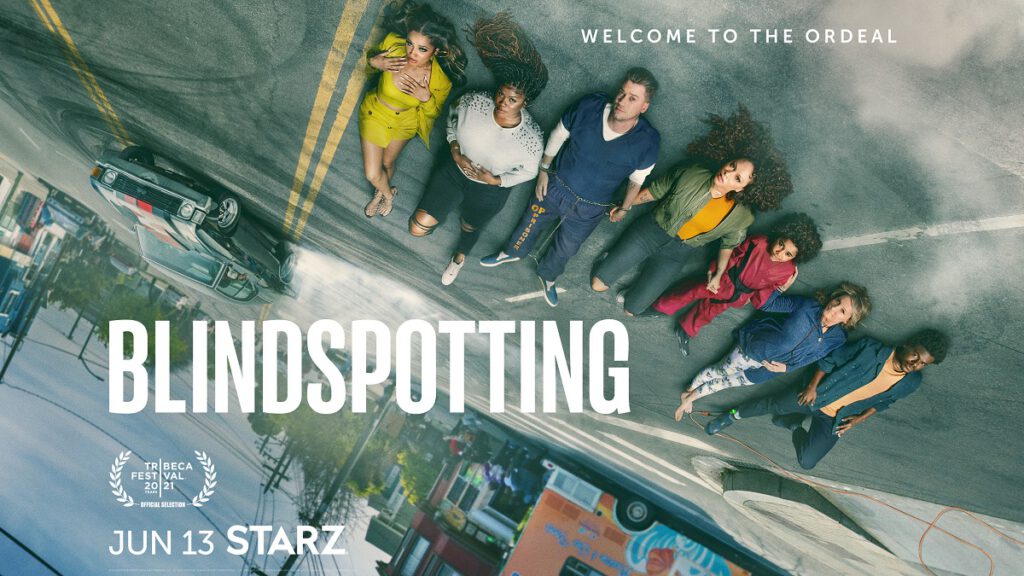Adapted from Carlos López Estrada’s same-titled 2018 movie, “Blindspotting” the television series bears some key similarities to the film but feels wholly different. For one, the eight-episode show airing on Starz doesn’t center Bay Area best friends Miles (Rafael Casal) and Collin (Daveed Diggs)—both Casal and Diggs, however, do serve as writers and executive producers. Rather this story considers Miles’ girlfriend, the mother of his young son Sean (Atticus Woodward), Ashley (Jasmine Cephas Jones, who also produced the series) as she struggles as a single mother while Miles serves time in prison.
“Blindspotting” returns to Oakland with an extended, new cast of characters: Ashley’s childhood best friend Janelle is back from traveling and is now living with her mother. Rooming with Janelle (Candace Nicholas-Lippman) as her mother’s tenant is the recently paroled Earl (Benjamin Earl Turner). Ashley moves in next door with Miles’ chilled out mom Rainey (Helen Hunt) and his chaotic sister Trish (Jaylen Barron). The movie’s lyrical storytelling techniques return too, except with greater musical flair. During these bite-sized half-hour long episodes, the team of writers build out a backstory for Ashley, a character who was severely underutilized in the film.
But while “Blindspotting” offers an expanded universe, adding rich layers to a once side character, its thematic elements read as undercooked and its visual ambition isn’t smoothly stitched to the primary narrative.

Ashley is our window into this world. Every episode features her rattling off verses and rhymes that elucidate her inner turmoil for Miles’ absence, her insecurities as a single-mother, and a wee bit of guilt. Elaborate camera movement and formalistic flourishes imbue the series with an elevated aesthetic: at one point, near the end of the premiere, Ashley and Sean visit an Oakland sideshow wherein cars spin donuts at rapturous speeds. On four separate street corners the giddy cast bop in unison, the action of the cars revolve in slow motion, and a cool melodic score warms the proceedings. At other junctions, jazzed rhapsodic horns rise to the beats of time-lapsed images, like Ashley waiting to visit Miles, or to the smooth movements of interpretive dancers. They’re beautiful keynotes to Ashley’s pent up anger, frustrations from her thankless concierge job at the Alcatraz Hotel, her lonely nights, and her heated confrontations with the big-talking Trish.
Instead of vocalizing how gentrification is slowly eroding the Bay Area, the writers on “Blindspotting” carve grating character dynamics. Ashley and Trish are the biggest culprits, as they share an antagonistic relationship stemming from Ashley advising Miles not to invest in Trish’s idea for her own stripclub run by women replete with a cooperative union. But in actuality, these two invite trouble like ice on a dark highway—Ashley routinely shames Trish for her revealing attire while Trish questions Ashley’s credentials as a mother and member of their family. Speaking of moms, it’s not altogether clear how Rainey fits in these subplots. Hunt pulls together a character who just isn’t a believable mother for Miles or Trish. In other words, how did a hippie white mom raise a black daughter and white son to be hood?
This show desperately wants to elicit serious conversations. These explorations, however, always feel half-finished. Part of the underdevelopment stems from the odd framing: how does one explore the effects of prison on a Black mom and son when the incarcerated father is white? Centering Ashley as the chief viewpoint greatly helps. Nevertheless, I was struck by how often black people are metaphorically used to fill the disjointedness of the topic. During Ashley’s first visitation with Miles, for instance, he’s the only white person there. And when she departs, she sees all the black inmates holding their hands on the glass. Their longing acts as an extension of Miles’ aching, as a heightened awareness of the hurt incarceration extracts. Later, two black dancers interpretatively glide through Rainey’s home as Ashley looks on. Both are meant to represent Collin and Miles, but they give the vibe of patchwork players used to paper over a gaping thematic hole.

The show’s firmer ground surrounds Earl. A distressing, understated character, as part of his one-year parole sentence, he wears an electronic ankle tag. Its radius doesn’t allow him to venture further than the church corner. For fear of returning to prison, the ankle tag’s low-powered battery forces him to connect to unbelievably long extension cords so he might have some range of motion. Unfailingly kind and philosophical, albeit hilariously weird, Earl is a show highlight. I just wish there were more.
In other episodes, the characters work through conversations about gentrification, banking, stereotypes, child discipline, and definitions of blackness, the latter of which stops just short of offering any insight. Rather each character speaks their truth about colorism and upbringing, but their ensuing debate is frustratingly one-note.
Instead, the heartbeat of “Blindspotting” is single motherhood, and the manifestations of certain insecurities. Miles frequently materializes to Ashley as her inner-monologue: he expresses the insults she wishes she could sling, the support needed in his absence, and an ever-guiding conscience. Ashley especially grapples with how to tell Sean that his father is in prison. A tangible heart exists in this series, especially in Jasmine Cephas Jones’ spirited performance as Ashley.
But the real pathos here is too often obscured by the ambition. The apparition of Miles awkwardly invades more than comically appearing, the flights of dancing read as too distanced from their desired effect, and the callbacks to the film are often lesser rehashes of the initially potent ideas. Even Ashley and Miles, in greater doses, aren’t totally plausible as a couple. Their chemistry falters, pitching them as mere comedic double-act rather obvious soulmates. Which is of course odd, since they seemed so interlocked in the film.
“Blindspotting” isn’t without good intentions, but its bundle of elegant ideas doesn’t offer a satisfying entrance into a new world.
Six episodes screened for review.












